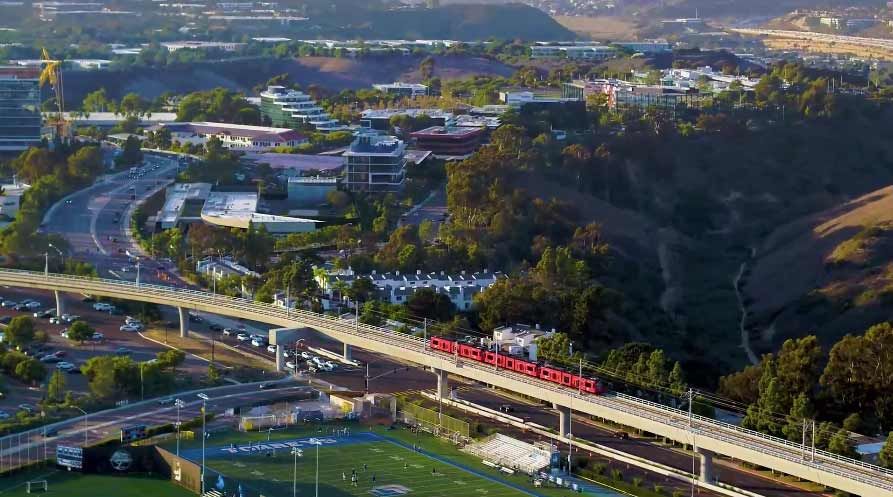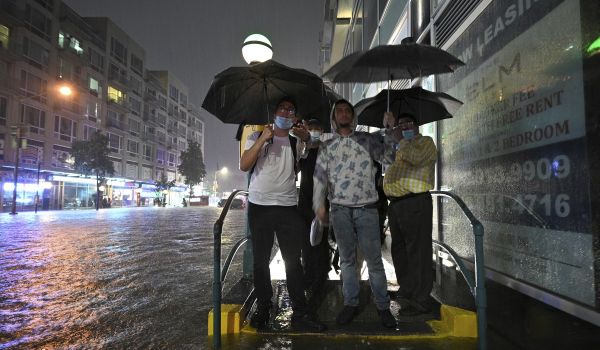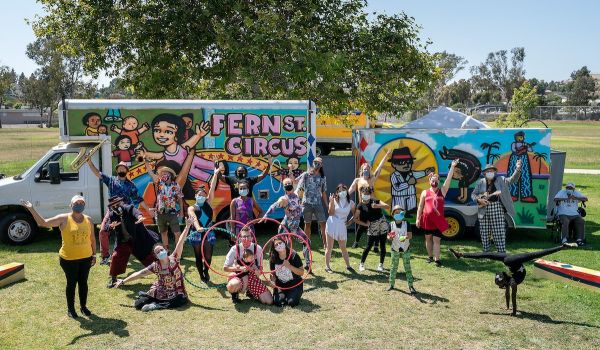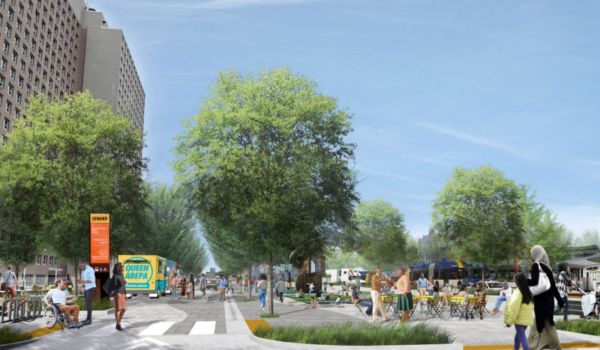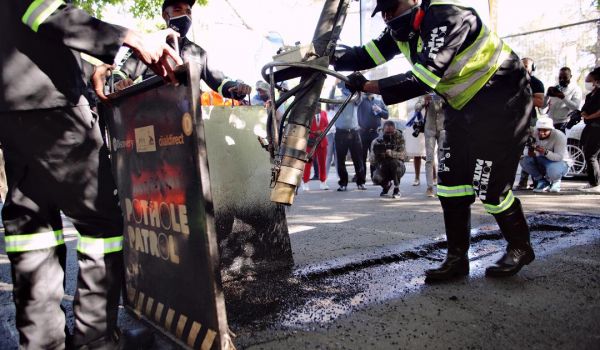Welcome to “The Mobile City,” our weekly roundup of noteworthy transportation developments.
Blue Line Extension Opening Produces Strong Ridership Gains in San Diego
According to reports in both Progressive Railroading and Metro Magazine, San Diegans enthusiastically climbed aboard the newest segment of the country’s oldest modern light rail transit system when it entered service Nov. 21.
The new extension of the San Diego Metropolitan Transit System’s (MTS) Blue Line takes the first of San Diego’s LRT lines to the University of California, San Diego (UCSD) campus.
According to both reports, Sunday ridership jumped by 74 percent on the San Diego Trolley system as of opening day. It surged even more on the Blue Line. According to Metro, ridership on that line more than doubled, from 25,000 riders to 60,000, about a 140 percent jump.
Progressive Railroading reports that MTS estimates that 24,000 of those riders boarded at the nine new stations on the extension. And more than 16,000 of those trips originated at just two of those stations: University Towne Center, the last stop on the extension, and UCSD Central Campus, three stops further in. (Other trip generators along the extension include the UCSD Health Sciences Campus in La Jolla and the San Diego VA Medical Center.)
“When we began this project, we knew it would be a game-changer for our region. This line had been under construction for five years, and the excitement and anticipation we all had was equally matched by the community,” MTS Executive Director Sharon Cooney said in a news release.
Prior to the opening, ridership on the San Diego Trolley had returned to 65 percent of pre-pandemic levels overall and nearly 70 percent of those levels on weekends.
Reconstruction Begins on Baltimore’s Howard Street Tunnel
Railway Track & Structures reports that the State of Maryland is finally moving off the dime on removing one of the chief obstacles to the Port of Baltimore’s growth: too-low clearances on the 126-year-old Howard Street Tunnel under downtown Baltimore.
Maryland Gov. Larry Hogan, CSX CEO and President Jim Foote and several state and Federal transportation officials came together at the north end of the tunnel next to the former B&O Railroad Mount Royal station on Nov. 29 for a ceremonial groundbreaking.
The tunnel will be rebuilt so that double-stack container trains can run through it to reach the port terminals. The project is part of a larger public-private partnership project that will improve vertical clearances at 22 points on the CSX line from Philadelphia to Baltimore.
The cost of raising the Howard Street Tunnel’s clearance by just 18 inches had been a roadblock to undertaking the project. But advances in construction technology enabled the state to slash estimated costs and disruption dramatically: where the project had originally been estimated to cost anywhere from $1 billion to $4 billion and significantly disrupt the area under which the 1.7-mile-long tunnel runs, technological changes reduced that cost to an estimated $466 million. Maryland will pick up $202.5 million of the total, with $125 million coming from a federal INFRA grant, $113 million from CSX, $22.5 million from Pennsylvania and $3 million in federal highway formula funding.
Enabling double-stack container trains to serve the Port of Baltimore means that the East Coast’s third-busiest port will be able to handle an expected surge in container traffic via a wider Panama Canal. It also means that more of that traffic can move by rail rather than by truck, reducing both emissions and congestion in the I-95 corridor.
Brightline Launches Bike Share in West Palm Beach
Brightline, the privately operated higher-speed rail line connecting Florida’s largest cities, is taking a big step towards allowing its users to travel car-free for their entire journey with the launch of a bike-share service in West Palm Beach.
A Railway Age news brief states that the BrightBike program will place 170 pedal-powered bikes decked in Brightline’s signature yellow at 17 docking stations around downtown West Palm Beach.
This first BrightBike installation is part of the company’s new Brightline+ service. Brightline+, which was announced this past September, made its debut along with the resumption of scheduled rail service in the first half of November. Brightline+ offers riders “door-to-door service” from origin to destination via shared or private rides to and from points up to five miles away from its stations. Riders can also use the Brightline+ app to book bike-share trips from the dock station nearest them to the Brightline train station in West Palm, and they can also use the bikes for local trips in their communities. The system will be operated by Micromobility Management, which also operates the CitiBike bike-share programs in Miami and Miami Beach, which are unaffiliated with New York’s Citi Bike. Members of both bike-share programs will be able to book shared bikes in the other city via a membership reciprocity program.
Brightline states that BrightBike is part of a “customer’s multimodal trip planning and booking experience that includes train service, local transit and ridesharing,” The company says that it will also add e-bikes to its fleet as well as additional docking stations in the future.
Nashville’s Stricter Sidewalk Requirements Survive Legal Challenge
Nashville is decades behind on building sidewalks — one analysis estimated nearly 5,000 miles of missing sidewalk in Davidson County. To fix this, the Metropolitan Government of Nashville and Davidson County (Metro) enacted an ordinance in 2017 that requires builders of housing developments on or near busy roads to either build sidewalks as part of their projects or pay money into a sidewalk paving fund.
Now Axios Nashville reports that federal judge Aleta Trauger has ruled in Metro’s favor in a lawsuit filed by a libertarian think tank last year. The Beacon Center said that the law placed too onerous a burden on developers.
Metro Council member Angie Henderson, who sponsored the sidewalk bill, told Axios that Nashville is “woefully behind on walkable infrastructure due to a lack of sidewalk requirements for over 70 years.”
Beacon Center director of litigation Jason Coleman said the law’s requirements were a matter of property rights: “If Metro Nashville wants to solve its sidewalk problem, Metro should pay for them, rather than forcing private property owners to build them or pay into a fund for sidewalks that are built nowhere near their home.” The Beacon Center says it intends to appeal the ruling to the Sixth Circuit Court of Appeals.
Know of a development that should be featured in this column? Send a Tweet with links to @MarketStEl using the hashtag #mobilecity.

Next City contributor Sandy Smith is the home and real estate editor at Philadelphia magazine. Over the years, his work has appeared in Hidden City Philadelphia, the Philadelphia Inquirer and other local and regional publications. His interest in cities stretches back to his youth in Kansas City, and his career in journalism and media relations extends back that far as well.
Follow Sandy .(JavaScript must be enabled to view this email address)

